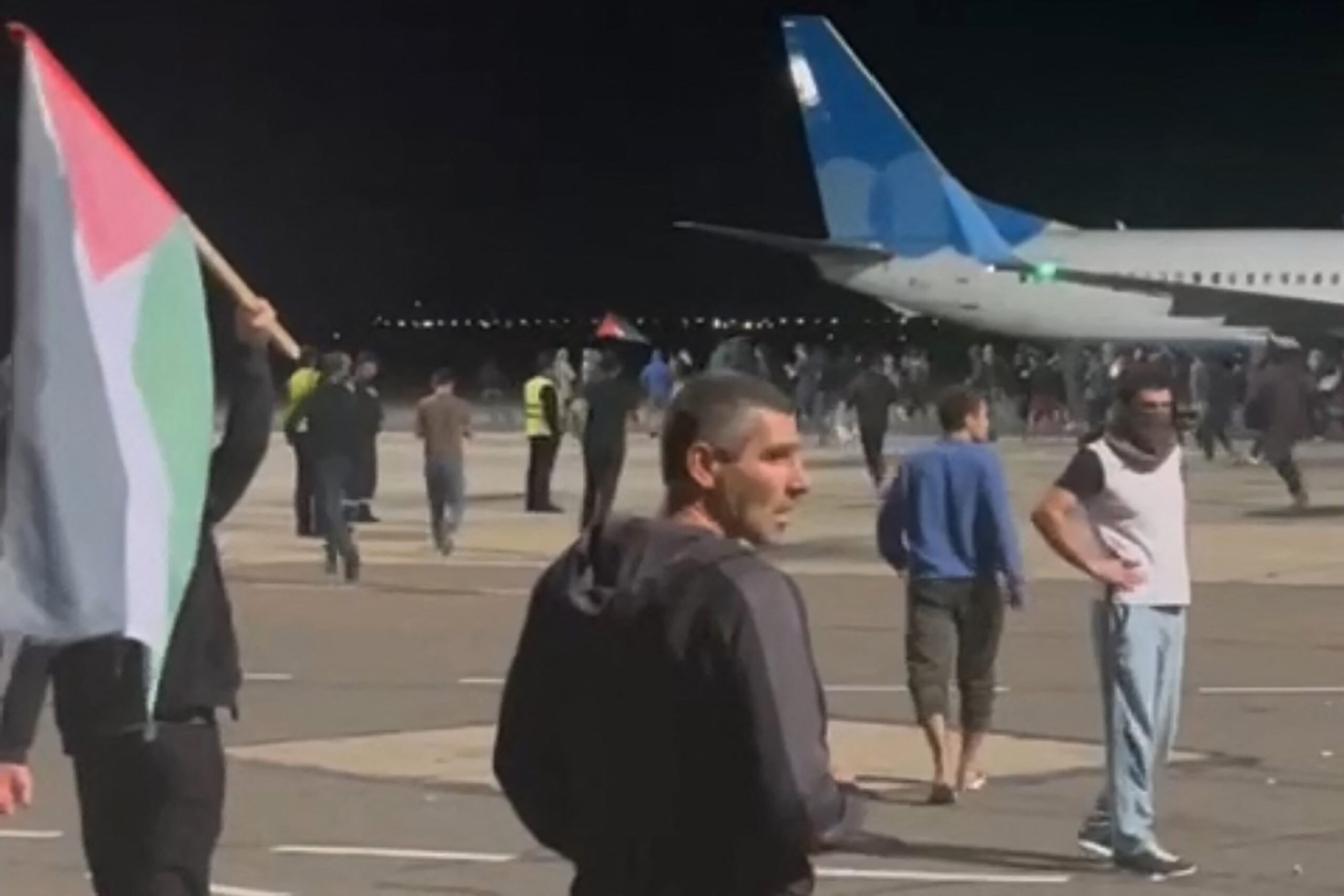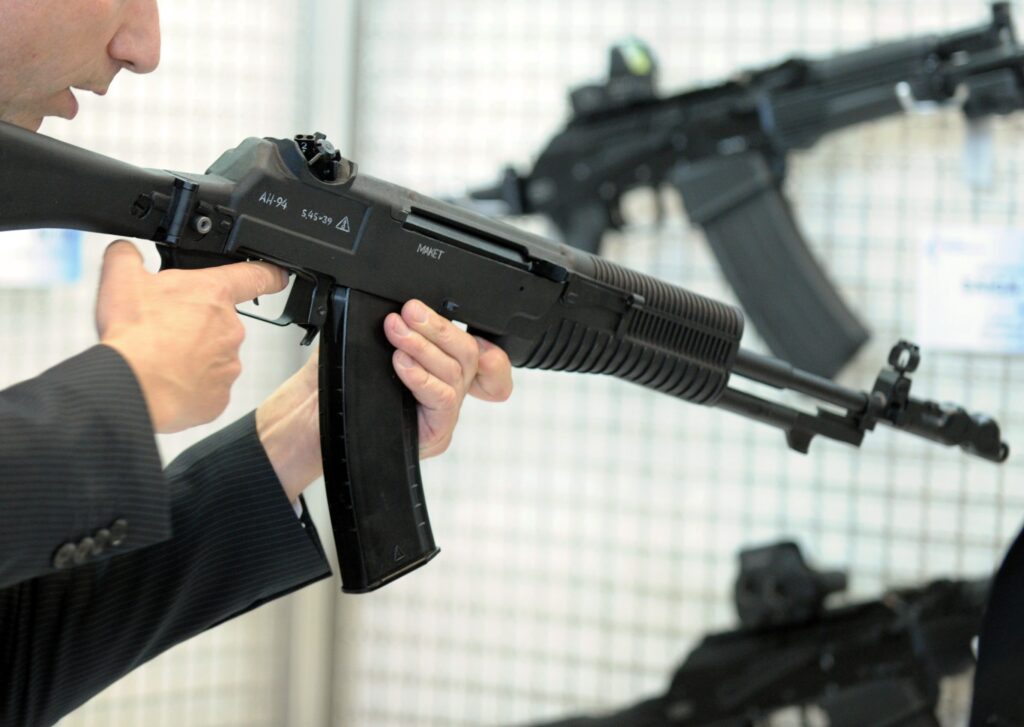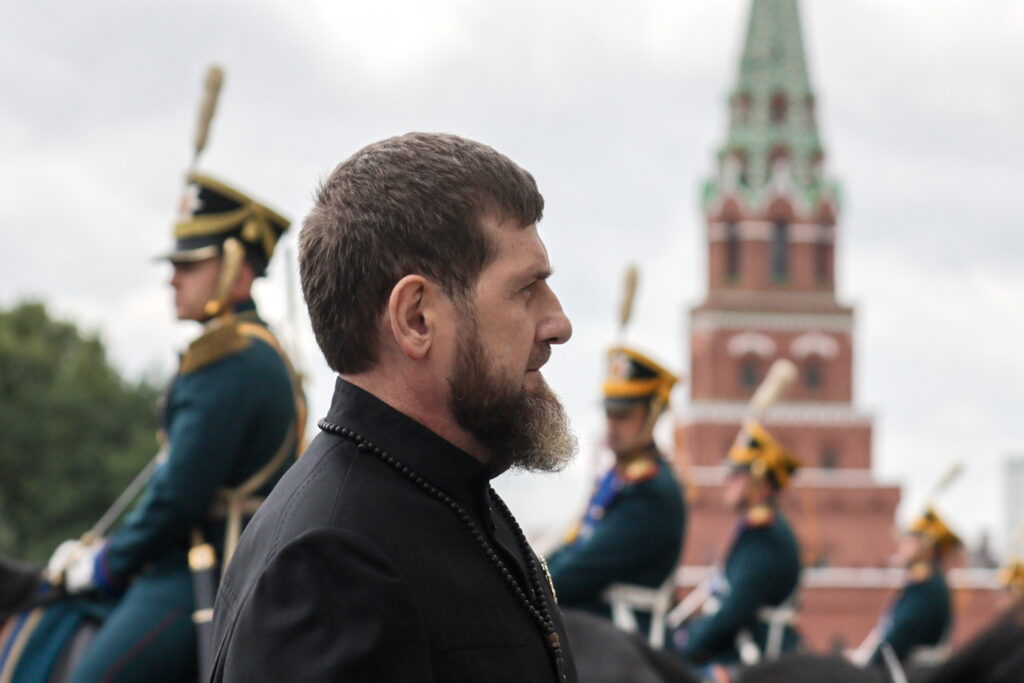On October 29th, an angry crowd assembled at Makhachkala’s Uytash International Airport because of a narrative that Israeli asylum seekers were arriving on a flight from Tel Aviv. The objective was not to welcome these theoretical arrivals—because the flight was comprised of families returning from medical treatment abroad—but to block them from entering Dagestan. The crowd began to hunt for Jews. They harassed travelers, at one point encircling a man baselessly suspected of being Jewish and attempting to drag a family off of a bus, before breaking into the airport terminal and twice flooding onto the tarmac. The airport, initially closed until November 6th, will reopen imminently. Roughly twenty people were injured during the clashes.
This incident took place over the background of other antisemitic acts in Dagestan and other regions of the North Caucasus, including an act of arson against a Jewish community center under construction in Kabardino-Balkaria. This is all despite the fact that Jews have long lived throughout the region, with no major antisemitic campaigns akin to what is currently occurring. Now, Dagestan’s Jewish community is considering evacuation. The current rise in antisemitism stems from the constant stream of media depicting the aftermath of Israeli airstrikes in the Gaza Strip.
This essay will briefly analyze how events proceeded, then address how systemic failures brought us to this moment. It will conclude by examining the implications of the storming of the Uytash airport.
Occupying an airport
With nearly two thousand participants according to one police estimate, this was a more complex event than just a storming of the airport: there were three «zones» of action, differing demographically based on the abundance of recorded footage. The three zones appear to have been active concurrently.
First, there was a protest with picketers against Jewish refugees and «child-killers,» located at the highway entrance to the airport area. This group was sparsely numbered and demographically mixed, with older women as prominent figures.
Second, the mob hunting for Jews outside and inside the airport’s Terminal B. They appeared to be exclusively men, tending toward middle-age. After breaking through the police line, the crowd eventually grew calmer and engaged in negotiations with present Dagestani officials, although looting has been reported.
Third, there were the tarmac breachers, who twice rushed onto the taxiways. They also clashed with police, throwing stones and other objects at them. They also marked their «victories» over the police, i.e., forcing them to retreat, by firing guns into the air. This more violent group was clearly comprised of younger men.
Most evidence of arrests during the storming of the airport were the first wave of tarmac breachers. They were small enough in number and security services were aiming to secure the tarmac, as evidenced in official messages. Overall, sixty people were arrested. The authorities can slowly arrest other participants over the coming days, as they were better captured by security cameras around the terminal.
Sentiments boil over
The attempted pogrom is not just rooted in antisemitic messaging, but in systemic dynamics in the region. General socioeconomic conditions in the republic continue to deteriorate. Basic necessities to live such as electricity, water, and gas are irregularly supplied, which led to sustained small protests only a few months ago. Additionally, Russia’s war in Ukraine has impacted Dagestan heavily, with significant casualties. Public appeals and small actions do not regularly succeed, with the authorities sweeping them aside. In some cases, residents have appealed directly to President Putin because of Governor Melikov’s unresponsiveness.
While North Caucasus regions have long been averse to public political expression, this has been even more pronounced in the wake of last year’s anti-mobilization protests. Melikov has all but eliminated channels for moderate public expression. This leads to tactical outbidding that favors dramatic, extreme actions. An inability to protest built up pressure until a mob emerged.
Expressions of solidarity with Palestinians are effectively banned, despite both Russia’s growing ties with Hamas and that the attempted protests are not anti-state. Nightly prayers are essentially the sole form of collective support for Palestine permitted by the state.
Analysis of the event’s causes should be wary of overemphasizing individual actors’ roles in organizing it. The popular «Utro Dagestan» Telegram channel has received considerable attention for amplifying antisemitic narratives and purportedly instigating the attempted pogrom. Previously, it played a major role coordinating the anti-mobilization protests. However, its repeated calls for greater and continued resistance in September 2022 were not acted upon after a couple of days. Likewise, the channel’s attempts to provoke resistance around the time of Wagner’s coup did not materialize. The influence of Utro Dagestan deserves focus, but assigning it causality would be misconstrued.
A strained system
The security services’ strategy came across as, at best, poorly executed containment, at worst, active passivity. They largely refused to intervene, other than attempting to keep the mob out of the airport and off of the tarmac. Additionally, considering the violence they were facing compared to the anti-mobilization protests, with some youth openly armed, the police showed greater restraint. In September 2022, on the first day of protests, officers twice fired warning shots into the air, with one brandishing his sidearm at protesters before shooting. In contrast, at the airport, an officer apologized for drawing his gun. This restraint is obviously good, as there was the potential for blood shed, but it supports the argument that non-engagement was a deliberate strategy.
There are three apparent explanations for the non-engagement strategy. First, instructions came from the top, with the authorities deciding they could maintain sufficient control over the situation, while allowing the mob to release its built-up emotions. This is unconvincing, as critical infrastructure was compromised and a state-organized solidarity rally in Makhachkala’s mains square would have been a better option. Second, non-engagement could suggest that the security services supported the mob’s actions. As such, they decided to not stop the attempted pogrom. Finally, the authorities could have decided non-engagement was the best strategy to avoid escalation, considering the threat of an armed mob. The final two arguments sound more convincing, but the type of data necessary to prove either is unlikely to emerge.
Regardless, the storming of Uytash is a major embarrassment for Melikov’s administration.
There are implications beyond Dagestan. Officials in Ramzan Kadyrov’s regime have expressed concern over the potential for similar events to occur in Chechnya. Chingiz Akhmadov, director of state TV channel «Groznyi,» labels similar arriving flight information fake. Minister for national politics, external communications, print and information Akhmed Dudaev cautions against provocative information. This will place greater pressure on Melikov to severely crack down.
To do so, Melikov will have to ensure mass arrests in the coming days. He will also likely promote the option for those arrested to deploy to Ukraine. While he has labeled rumors about this possibility «fake,» this is too clearly a prime opportunity to coerce manpower resources. He has already laid the groundwork to change this position. In his first official statement, Melikov already rhetorically tried to undermine the masculine identities of the Uytash mob, saying they «stabbed in the back» the defenders of the motherland. This is a tactic he has previously utilized to attempt to force critics into deploying.
Indicating the seriousness of the situation, Moscow has responded quickly. The federal Investigative Committee is handling criminal cases, while Putin has called a meeting that has required Defense Minister Shoigu to cut short a trip to China. Putin, as Melikov and other Dagestani officials have done, is blaming outside actors for the mob. Substantial involvement by Moscow will further strengthen the impending crack down.
The arrival of a military convoy in Makhachkala indicates the government’s preparation for continued troubles. As seen in the anti-mobilization protests, Dagestan’s young men are typically prepared to clash with police, so violence at the airport was not entirely surprising. However, the tarmac breachers went further than the usual brawling, with them firing shots into the air. This fact will not be overlooked. The authorities have been closely watching dynamics related to youth radicalization, calls for partisan action, and militant activity.
Dagestan, and likely the rest of the North Caucasus, is now facing heightened repression as a result of the storming of Makhachkala’s airport. This repression will not address actual problems or mobilizing factors, but add pressure within a strained system. The increase in antisemitic incidents reveal the potential for an explosion, as they represent uncontrolled violence beyond the state’s control—but, for now, it is not targeting the authorities.










